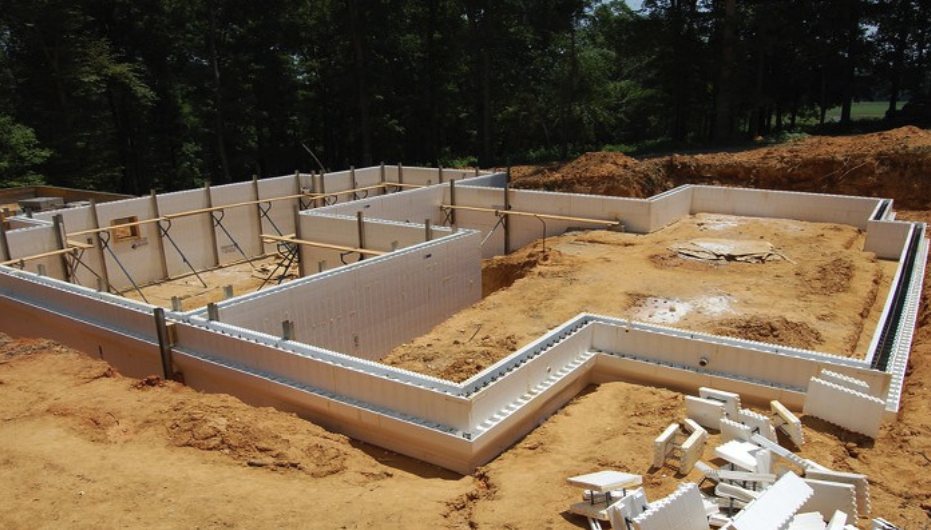
Insulated Concrete Form Foundations Vs. Poured Concrete Foundation

Contractors and architects striving to build durable, strong, and energy-efficient foundations should consider Fox Block insulated concrete form (ICF) over poured concrete foundations. ICF and poured concrete foundations both aim to support a building and resist lateral forces and buckling. However, a high-performing foundation must also seek to resist cracking, moisture intrusion, and heat flow.
ICF foundations, like one built with Fox Blocks, more effectively resist heat flow, cracking, and moisture intrusion over poured concrete foundations.
Why a Strong Foundation is Important
A strong foundation gives a building or home integrity against the forces of nature. It also ensures a safe place to live, work, etc. A foundation supports and anchors a building. It is also a water and soil vapor barrier. Importantly, a foundation is responsible for all the load transfers from the building to the ground.

There are several foundations used in modern construction: crawlspace, slab on grade, and basement.
- Crawlspace foundations support the entire structure and are similar to basement foundations, only they are more shallow - three to four feet deep.
- Slab foundation is a concrete slab, between four and eight inches thick. Slab foundation is the least expensive of the three foundations.
- A basement foundation supports the entire structure. A basement foundation is a minimum of eight feet above the footings and provides living and storage space.
Two materials used to construct foundations are ICF and poured concrete.
Insulated Concrete Forms Foundations
ICFs provide durability and insulation for below-grade walls. Constructing ICF foundations involves dry-stacking expanded polystyrene foam panels, or interlocking hollow extruded polystyrene foam, to a foundation’s length. The forms are reinforced and braced. Workers then pour concrete into the hollow form panels. ICF foundation construction is a fast and simple method of building below-grade walls.

Advantages of ICF Foundations
- ICFs provide an excellent curing environment for concrete walls, resulting in a concrete foundation with about double the compressive strength of conventionally poured concrete foundation.
- ICF foundations are disaster-resistant. For example, Fox Blocks, with steel reinforced concrete, are disaster-resistant and can withstand tornado and hurricane winds exceeding 200 mph, and projectile debris traveling over 100 mph.
- ICF foundations incorporate continuous insulation and have few to no thermal bridges.
- ICF foundations have built-in insulation values of greater than R-20. For example, foundations built with Fox Blocks exceed ASHRAE/ANSI 90.1 energy code requirements with an R-value of 23.
- ICF walls are fire-resistant. For example, Fox Blocks have a fire-resistance rating (ASTM E119) of 4 hours for the 6-inch blocks and 2 hours for the 4-inch blocks.
- ICF is termite resistant with an application of a product like Polyguard Products, Inc. 650 XTM or 650 XTP membranes.
- The ambient temperature can be as cold as 5°F when pouring of concrete into the ICFs.
Poured Concrete Foundations
Poured concrete foundations became popular in the 1980s. Constructing a poured concrete foundation involves placing forms on top of spread footings. Then steel rebar is placed between the forms. The last step is to pour concrete into the forms. Poured concrete walls are 8-10 inches thick and available with surface patterns, like brick, which provides a finished appearance.

Advantages of Poured Concrete Foundation
- Poured concrete foundations provide a high level of strength and durability and can last for decades. Also, poured walls have a compressive and flexural strength several times that of concrete block.
- Poured concrete foundations are fire-resistant. Solid wall construction affords at least twice as much protection against fire as hollow core concrete block
- Poured concrete foundations are termite-resistant.
Disadvantages of Poured Concrete Foundation
- Poured wall concrete should not be poured in very cold weather.
- Water leakage problems in poured concrete foundations
- If not prepared correctly, poured concrete can crack, which water can leak through. These cracks are often difficult to find and require the building owner to dig up all the concrete to find the source of leakage.
- Poured concrete walls can leak moisture through non-structural cracks in the wall, where the floor and wall meet, at the top of the foundation wall or through the porous concrete.
- Leaks may occur if the foundation drops, settles, or sinks due to the soil below the foundation collapsing.
- Dry spots in the concrete wall can occur by improper grading or poorly planned outdoor construction.
Insulated Concrete Form Vs. Poured Concrete Foundations
ICF foundations are more energy efficient, less prone to moisture intrusion, less sensitive to cold temperatures than poured concrete foundations.
- ICF foundations have an R-value of greater than 20. Poured concrete foundations have R-values of less than 3.
- Because the forms protect the concrete of ICF foundations, they are less susceptible to cracking and leaking than poured concrete foundations.
- ICF foundations can be constructed most times of the year because it is not as sensitive to cold temperatures as poured concrete.
- ICF foundations have the about double compressive strength of conventionally poured concrete foundations. Therefore there is less opportunity for moisture intrusion with ICF than poured concrete.
- Poured concrete foundations are more prone to shifts in the ground and water pressure than ICF foundations. So, poured concrete foundations are more at risk of cracking and leaking, which can lead to mold and mildew growth.
ICF and poured concrete foundations both strive to support a building and resist lateral forces and buckling. However, a high-performing ICF foundation, like one built with Fox Blocks, is more energy-efficient and resistant to cracking and moisture intrusion than poured concrete foundations. Builders and architects aiming to construct durable, healthy, and energy-efficient foundations should consider Fox Block ICF construction.